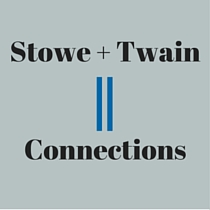In the fall of 2015, Capital Community College offered a course on Harriet Beecher Stowe and Mark Twain taught entirely at the Stowe and Twain museums. Below are reflections by the professor and two students on the power of literature to connect us.
From Jeff Partridge (age 51):
It was a moment that every literature teacher cherishes—an emotional and intellectual connection with a novel ignites an impassioned discussion about real life today.
We were sitting in a large circle in the parlor of the Katharine Seymour Day House at the Harriet Beecher Stowe Center. Eighteen students, ranging in age from 19 to 75, black, white, Asian, Latino, female, male, immigrant, US-born—and the topic was Uncle Tom’s Cabin, specifically, the moment when Ophelia, a New Englander, having expressed her moral indignation at slavery now reveals her abhorrence of blackness as little Eva kisses and hugs her family’s slaves.
A Caribbean student points out the irony, concluding that it was possible for a person to be anti-slavery while still being racist. A white student in her sixties expands on the point—the North may not have been slave-holding, but racial prejudice still ran deep.
And then it happens, that moment that makes all the months of preparation and course-planning worthwhile. A young student suddenly says, “It’s the same today,” and she goes on to share something from her own experience as a Latina in America that illustrates what we had just witnessed in Stowe’s character.
Her comment sparks an open conversation throughout the classroom, and I just sit back and wonder at the power of literature.
Finally, I draw the students’ attention to what just happened. A thick, old novel sitting on the dusty shelf of time just spoke into our lives today. “Isn’t it great,” I ask, “that these words written by Stowe over 150 years ago still speak to us today?”
And then I grasp the irony of my own statement. “Actually,” I say. “That’s not so great, is it? In fact, it’s pretty sad.”
–Dr. Jeff Partridge is the Chair of Humanities at Capital Community College and director of the Hartford Heritage Project (www.capitalcc.edu/hhp)
From Woody Exley (age 75):
I first read The Adventures of Huckleberry Finn as a college freshman. I remember the class because of the professor’s unapologetic use of the N-word in our discussions. Everyone was white, and we lacked the insights that greater diversity would have generated. This was in the late 1950s, before the civil rights movement took off.
Fast forward many years. I recommended to my book group that we read Mark Twain’s masterpiece. Again, it was a white people’s discussion devoid of varying perspectives on our country’s racial history.
Fast forward again to 2015. Capital Community College offered a class on Mark Twain and Harriet Beecher Stowe at the authors’ homes. Reading novels by Stowe and Twain and discussing them under the tutelage of a learned professor and staff experts from the museums gave me a profound connection to the reality of the racial oppression that runs so deeply within the fabric of U.S. history. I felt this connection with the horrors of slavery much more powerfully through literature than would have been possible by reading history.
Most important was the makeup of the class. We were young and old, white and black, with varied experience and points of view. After all these years, I was grateful to discuss books about racial prejudice and oppression with a class that included persons of color.
Reading Huck Finn this time connected me to bright young people of today and gave me an opportunity to learn from their perspectives. That’s the power of literature.
–Woody Exley is a communications consultant who lives in West Hartford.
From Trishan Lakha (age 21):
Literature is a powerful vehicle by which a message can be disseminated irrespective of time, geography, and society. Harriet Beecher Stowe’s Uncle Tom’s Cabin is one such piece; it is as pertinent in stoking the furnaces of change today as it was in the waning years of antebellum America. Our reading of Uncle Tom’s Cabin in class helped us as a class to realize that at every era of history, and even today, organized institutions and the greed of unregulated capitalism marginalizes and disenfranchises groups for financial benefit. Further, the very composition of Stowe’s watershed novel demonstrates that one can take a stance via nonviolent means that can be the catalyst of monumental change.
An anecdote that was told by a fellow classmate resonates with me; this man, matured with the hue of time and experience, related that during the civil rights era he was a journalist and documented the major events of the movement objectively. He stated that his regret is that he merely told the story but was not a part of it, because he did not take action. This anecdote, based on what we were discovering in Stowe’s Uncle Tom’s Cabin and Twain’s Huckleberry Finn, struck a chord with me and made me ask, what is my stance on controversial issues of our times? What about my generation? Are we merely watching history pass by or are we making history?
–Trishan Lakha is a finance student at Capital Community College.
More information about Studies in American Literature: Stowe and Twain English 220 may be found here: http://capitalcc.edu/hhp/courses.html









